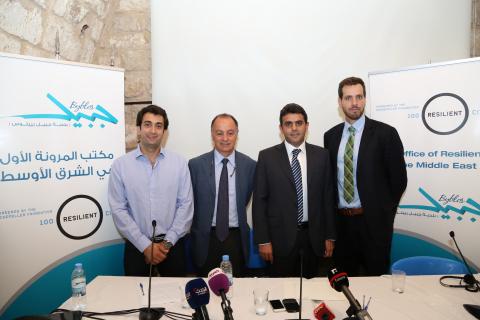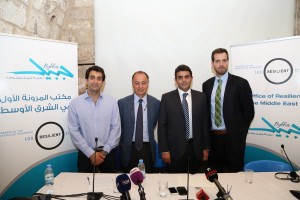
PIONEERED BY THE ROCKEFELLER FOUNDATION, ANNOUNCE CREATION OF THE FIRST “OFFICE OF RESILIENCE” IN THE MIDDLE EAST; ZIAD HAWAT APPOINTS TONY SFEIR AS BYBLOS’ FIRST CHIEF RESILIENCE OFFICER
“Office of Resilience” is Groundbreaking New Concept Designed to Help Cities Integrate Existing Initiatives and Better Plan for the Shocks and Stresses They Face, in a Holistic and Effective Way
CRO Tony Sfeir Will Lead Resilience Office and Byblos’ Resilience Building Efforts
100 Resilient Cities Is an Organization Dedicated to Building Urban Resilience In 100 Cities Around The World – Byblos Is a Founding Member of $100M+ Challenge
Byblos, Lebanon, 24 July 2014 – Today the City of Byblos and 100 Resilient Cities - Pioneered by the Rockefeller Foundation (100RC) announced the creation of the first “Office of Resilience” in the Middle East. Tony Sfeir was appointed as the city’s Chief Resilience Officer (CRO), and will lead the Office of Resilience. The appointment of a CRO is a key component of the city’s partnership with 100RC.
The office will lead the complex task of resilience building in Byblos. Resilience building must address not just the shocks – earthquakes, fires, floods, etc. – but also the stresses that weaken the fabric of a city on a day to day or cyclical basis. Examples of these stresses include high unemployment; an overtaxed or inefficient public transportation system; endemic violence; or chronic food and water shortages. By addressing both the shocks and the stresses, a city becomes more able to respond to adverse events, and is overall better able to deliver basic functions in both good times and bad, to all populations. In addition to leading these efforts in the city, Byblos’s innovative Office of Resilience will serve as a model for other cities around the world.
In his opening speech during the conference, Ziad Hawat, Mayor of Jbeil, commented: “100RC is a reliable partner to lay the cornerstone for this long way that we shall walk together for our city to become a safer, stronger and more resilient place, capable of facing difficulties and crises. Mr. Tony Sfeir, member of the municipal council has been appointed as Chief Resilience Officer (CRO) in recognition of his efforts in this area, and I am confident that this team that will be granted my support and that of the Municipal Council will serve as a link between all of us and the 100 RC and it will be up to the great responsibility entrusted to it and will succeed in elaborating an action plan that will be beneficial to our beloved city”.
Tony Sfeir, Chief Resilience Officer of Byblos, said in his speech during the conference: "In a region full of uncertainty and a time when the world is somewhat ahead of us, it dawned on us that it is time to rethink our priorities, re-evaluate some of our habits and re-adapt ourselves to a new interconnected world that is very interactive and constantly and rapidly changing". We are entirely convinced that investing in resiliency is like investing in education. It might be a long, slow and somewhat possibly turbulent investment but it is a sure way for a brighter future and an improved quality of life. Despite all the crisis and shocks coming our way on every level, the technical and financial assistance that 100RC will provide us with; will help us make ourselves more immune and more resilient as a city".
 The Office of Resilience will have a number of key mandates, including:
The Office of Resilience will have a number of key mandates, including:
- Integrating stakeholders from across silos of government and sectors of society (businesses, NGOs, Academic institutions, etc) into the resilience building process.
- Using these stakeholders, in addition to sophisticated analysis tools and technical support, to uncover the broad range of threats and challenges the city is facing.
- Integrating all city plans and initiatives into a single resilience strategy in order to ensure that the collateral benefits of each plan is realize, that they are not at odds, and that they are being created through a resilience lens.
- Developing a comprehensive resilience strategy to address the greatest threats the city faces.
A resilience office is different from a sustainability office, or an emergency management office. It encompasses some of the tasks of those offices, but its responsibility is far broader. It is responsible for ensuring the city is addressing all shocks and stresses it faces, and integrating all of its initiatives, so it can serve the needs of its citizens in both good times and bad.
Byblos was selected as one of the first 32 members of what will ultimately be a 100-city global network, and will receive technical support and resources to develop and implement a resilience strategy. More details about 100 Resilient Cities and the Challenge can be found below.
About 100 Resilient Cities - Pioneered by The Rockefeller Foundation, and the 100 Resilient Cities Challenge
100 Resilient Cities - Pioneered by the Rockefeller Foundation (100RC) is dedicated to helping cities around the world become more resilient to the physical, social and economic challenges that are a growing part of the 21st century. 100RC supports the adoption and incorporation of a view of resilience that includes not just the shocks – earthquakes, fires, floods, etc. – but also the stresses that weaken the fabric of a city on a day to day or cyclical basis. Examples of these stresses include high unemployment; an overtaxed or inefficient public transportation system; endemic violence; or chronic food and water shortages. By addressing both the shocks and the stresses, a city becomes more able to respond to adverse events, and is overall better able to deliver basic functions in both good times and bad, to all populations.
Cities in the 100RC network are provided with the resources necessary to develop a roadmap to resilience along four main pathways: 1) Financial and logistical guidance for establishing an innovative new position in city government, a Chief Resilience Officer, who will lead the city’s resilience efforts; 2) expert support for development of a robust resilience strategy; 3) Connecting member cities to solutions, service providers, and other partners who can help them develop and implement their resilience strategies; and 4) Membership in a global network of member cities who can learn from and help each other. Through these actions, 100RC aims not only help individual cities become more resilient, but will facilitate the building of a global practice of resilience among governments, NGOs, the private sector, and individual citizens.
The 100 Resilient Cities Challenge was launched in 2013 as a $100 million commitment to build urban resilience. Officials or leaders or major institutions from almost 400 cities applied to the Challenge, and the initial 32 cities were announced in December 2013. Results of the second round of the challenge – open from July to September of this year – will be announced in December. Information on the Challenge itself will be available here: www.100resilientcities.org/challenge.
100RC is financially supported by The Rockefeller Foundation and managed as a sponsored project by Rockefeller Philanthropy Advisors (RPA), an independent 501(c)(3) nonprofit organization that provides governance and operational infrastructure to its sponsored projects.
Learn more about 100RC at www.100resilientcities.org and RPA at www.rockpa.org.
About The Rockefeller Foundation The Rockefeller Foundation aims to achieve equitable growth by expanding opportunity for more people in more places worldwide, and to build resilience by helping them prepare for, withstand, and emerge stronger from acute shocks and chronic stresses. Throughout its 100 year history, The Rockefeller Foundation has enhanced the impact of innovative thinkers and actors working to change the world by providing the resources, networks, convening power, and technologies to move them from idea to impact. In today's dynamic and interconnected world, The Rockefeller Foundation has a unique ability to address the emerging challenges facing humankind through innovation, intervention and influence in order to shape agendas and inform decision making. For more information, please visit www.rockefellerfoundation.org
For more information, please contact:
farah.bachacha@ws-mena.com
Categories
- Log in to post comments

